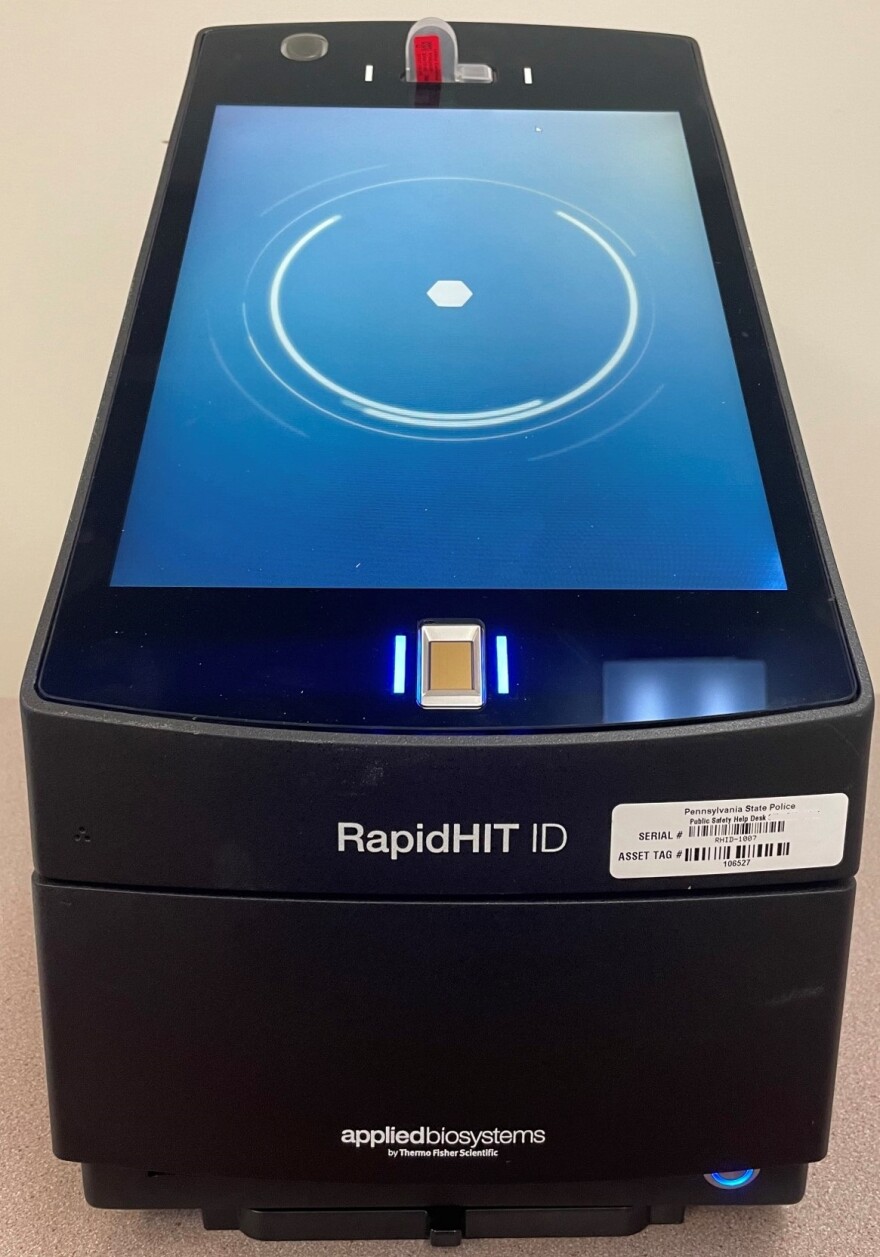BETHLEHEM, Pa. — In a significant move to strengthen criminal investigations, state police have rolled out compact machines capable of analyzing forensic samples and generating DNA profiles in as little as 90 minutes.
Fifteen of the devices, called RapidHIT ID systems, were distributed in early May to the forensic services units, or FSUs, of 15 state police troops across the commonwealth, PSP Communications Director Myles Snyder said.
They include Troop M in Bethlehem.
Troops in each unit completed mandatory training on the systems, Snyder said, ensuring a smooth implementation of the technology.
“It doesn’t take long for that system to say whether or not it has a match."Pennsylvania State Police Communications Director Myles Snyder
Roughly the size of an old desktop printer or fax machine, each device is housed within a forensic services unit, Snyder said.
Its function is powerful but simple: A sample of DNA, such as blood left at a crime scene, is placed into a sterile cartridge and inserted into the machine.
Within 90 minutes, the fully automated process can produce a DNA profile and run it through the State DNA Index System, which contains samples from individuals required to submit DNA as a result of criminal convictions.
“It doesn’t take long for that system to say whether or not it has a match,” Snyder said.
'Significant advancements'
The technology already has proven its worth in the western part of the state.
“Very early into the launch, there was a case where someone attempted to break into an ATM,” Snyder said.
“They damaged the machine and left behind blood. Troopers took that blood sample, took it to the FSU of the troop and the FSU member inserted the cartridge.
“The machine did its job and in 90 minutes it passed green and they had a hit from the state DNA index system.”

Snyder said that match gave troopers an immediate investigative lead.
“That gives a very strong start to the investigation,” Snyder said. “It went from not having any idea [on a potential suspect] to having a person to talk to and a lead to follow up on.”
But Snyder emphasized the process is not a shortcut to justice.
Any match generated by the rapid DNA analyzer still must be verified by forensic scientists, and investigations remain comprehensive and in compliance with all state and federal guidelines.
“You have an investigative lead and suspect identification," he said. "The trooper would still talk to that person, find their whereabouts and get their story."
But that lead is one that arrives far sooner than under traditional methods, where more time would pass before results are returned from a centralized lab.
PSP said it’s a major step forward in the ability to bring justice to victims and hold offenders accountable.
“This program represents significant advancements in our forensic capabilities,” PSP Comissioner Col. Christopher Paris said.
“Rapid DNA analysis can expedite the development of investigative leads, assist in suspect identification and help exclude individuals with greater speed.
“Aside from investigative efficiency, this technology provides accuracy, fairness and better outcomes for the communities we serve.”
'We can follow much quicker'
The cutting-edge technology by Thermo Fisher Scientific not only provides troopers with timely, actionable information on current cases, but also can be used for cold case investigations.
“The DNA technology overall in the last 10-15 years has significantly increased,” Snyder said.
“They can now go back and look at some of those [cold case] samples and may have enough to obtain a DNA profile they couldn’t get before.”
That potentially can connect someone to an unsolved crime, ultimately benefiting case resolution and bringing closure to families.
“It’s still an investigation that is as comprehensive and thorough as it was before. We just have a preliminary investigative lead we can follow on much quicker than the traditional laboratory environment alone.”Pennsylvania State Police Communications Director Myles Snyder
Overall, the RapidHIT system will save time and costs, Snyder said.
He said it’s less expensive than traditional DNA analysis, and further savings and benefits will come from a faster resolution to cases, reduced recidivism and potentially from crimes prevented.
“It’s still an investigation that is as comprehensive and thorough as it was before,” he said.
“We just have a preliminary investigative lead we can follow on much quicker than the traditional laboratory environment alone.”


